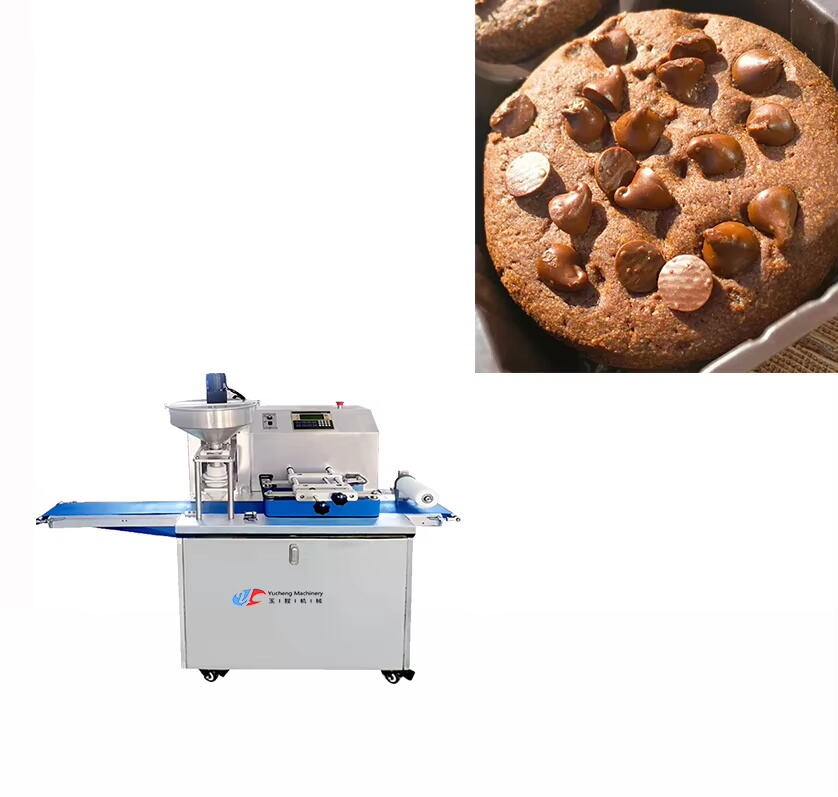Introduction to Chocolate Chip Cookie Making Machines
Why the Right Equipment Matters for Cookie Production
Getting the right equipment makes all the difference when it comes to better efficiency and quality during cookie production runs. Businesses can keep things consistent across batches while growing their operation without breaking a sweat. Take chocolate chip cookie machines as an example they cut down on labor expenses and basically eliminate those pesky mistakes that happen when workers have to do everything by hand. When production lines work well, every batch comes out looking and tasting pretty much the same, which is exactly what customers want from their favorite treats. After all, nobody likes biting into a cookie that's too doughy or burnt because of inconsistent baking times.
Research shows that putting in place specialized machines can boost production efficiency by around 30% or more, which represents a major leap forward for bakeries looking to improve their operations. When bakeries adopt automated systems, they find that their production lines run smoother with fewer workers needed at various stages, cutting down on mistakes that happen when people get tired or distracted. These savings don't just sit in the bank either they free up money that can go towards developing new cookie flavors or expanding distribution channels. With consumers wanting better quality baked goods than ever before, cookie manufacturers who haven't upgraded their equipment are finding themselves left behind as competitors take market share with faster, cleaner production methods.
Overview of Modern Cookie Manufacturing Technology
Today's cookie manufacturing relies on all sorts of high tech equipment that makes baking faster and more efficient. We're talking about industrial mixers that can handle massive batches, computer controlled conveyors that move dough through the factory, and temperature sensors that keep everything just right during baking. These machines aren't just fancy gadgets either they actually make a real difference for commercial bakeries. With this kind of tech in place, cookie makers can count on getting consistent results every time, whether it's the chewy texture customers love or the exact amount of sweetness that hits the spot. Some smaller operations still stick to older methods, but most big manufacturers have made the switch because quality control matters so much in today's competitive market.
The baking industry is seeing a big shift as more factories bring in robots and smart tech to boost how fast they work and make better products. When bakeries automate their processes, they don't just speed things up. They actually get to check each batch while it's still hot, which means fewer bad batches end up on store shelves. According to recent studies from FoodTech Insights, companies that have invested in automated systems saw their monthly output jump by around 30% last year alone. Plus, customer complaints dropped significantly because the machines catch issues humans might miss. For small bakery owners watching their bottom line, keeping up with new tech isn't just nice to have anymore it's becoming essential if they want to compete with larger manufacturers who already have these systems running full tilt.
Automatic Dough Mixing and Portioning Systems
Advanced Mixing Technology for Consistent Dough Quality
Good mixing tech makes all the difference when making quality cookies. These machines give bakers much better control during the mixing process so the dough comes out consistent every time. When bakeries switch to automated systems, they see fewer mistakes happening because people aren't manually measuring ingredients anymore. The result? Less wasted dough and products that taste the same from batch to batch. Most commercial bakeries report cutting down their waste by around 15% after upgrading their mixers. And that matters a lot for small businesses trying to stay profitable while keeping standards high. Properly prepared dough isn't just about taste either it helps operations scale smoothly without compromising on quality as demand grows.
Portion Control Mechanisms for Uniform Cookie Sizes
Getting portion control right makes all the difference when it comes to making cookies that are consistently sized across batches. This matters because people want their snacks to look the same every time they open a package, which helps build trust in the brand over time. Better portion control tech actually cuts down on wasted ingredients, something that adds up nicely at the bottom line for manufacturers. Most food industry guidelines stress uniform sizing since research shows customers tend to gravitate toward products that look consistent from one pack to the next. When bakers get this right, not only do shoppers know what to expect, but companies maintain their standing against competitors who might be struggling with quality control issues themselves.
Precision Baking Time and Temperature Control
Adjustable Settings for Perfect Baking Results
Getting the right balance between baking time and oven temperature makes all the difference when it comes to consistently great cookies. Modern baking tech allows bakers to adjust these parameters precisely according to what each batch needs, so cookies come out just right instead of too dry or still doughy inside. Keeping baking equipment properly calibrated helps maintain consistent taste and texture across batches, something customers notice and appreciate, plus it builds trust in the product quality over time. Industry data shows that careful management of baking conditions reduces common mistakes such as burnt edges or raw centers by around 25% or more, which explains why most bakeries consider this attention to detail essential for producing reliable results day after day.
How Temperature Stability Ensures Evenly Baked Cookies
Keeping things at just the right heat while baking makes all the difference when it comes to getting those perfect cookies every time. When temperatures swing too much during the process, we end up with gooey middles or tough edges that nobody wants. The good news? Modern kitchen appliances come equipped with smart tech that keeps the heat steady inside, so each batch turns out pretty much the same way. Bakers who have worked with these upgraded models report better results across the board. People notice the difference in texture and flavor, which means happier customers overall. For businesses making large quantities, this kind of consistency isn't just nice to have it's practically necessary for maintaining their reputation.
By integrating precision baking equipment with adjustable settings and temperature stability, businesses can ensure each batch of cookies meets high-quality standards. This attention to detail not only optimizes resource use but also enhances overall consumer experience, making it a vital component of any successful baking operation.
Customizable Cookie Shaping and Size Options
Interchangeable Molds for Versatile Cookie Designs
The ability to switch out molds is changing how cookies get made these days, letting manufacturers play around with all sorts of shapes and designs. This kind of flexibility really speaks to what people want now, helping brands stand out when there's so much competition on store shelves. Take holiday shapes or limited edition designs for example they make a big difference in what makes a brand memorable. Some studies suggest that companies offering special shapes see about a 20 percent jump in sales, which shows just how much variety matters to shoppers. When bakeries start using these interchangeable molds in their production lines, they don't just reach more customers, they keep things fresh and exciting too.
Adapting to Market Trends with Size Customization
Being able to customize sizes matters a lot for businesses wanting to keep up with what's happening in the market and what customers actually want. Manufacturers need this flexibility because people sometimes prefer bigger cookies for snacks, while others might go for smaller ones during lunch breaks or office parties. Production lines that handle different sizes help companies tackle holiday rushes or limited time offers without shutting down operations completely. Looking at industry data shows that firms which tweak their product dimensions as trends shift tend to outperform competitors. When brands get this right, they not only please current customers but also build lasting relationships that keep those same customers coming back season after season.
High-Speed Production Capacity for Scalability
Maximizing Output with Industrial-Grade Machinery
Big industrial cookie machines really matter when it comes to keeping up with production needs and scaling operations in this tough marketplace. These heavy duty appliances run at lightning speed, letting bakeries and food manufacturers keep pace with growing orders without compromising on taste or texture. Switching over to fast track cookie production typically boosts output around 35-40% give or take depending on setup, which opens doors for business expansion. Getting hold of these kinds of machines has become almost mandatory for any company serious about grabbing more shelf space in grocery stores while still delivering fresh batches day after day.
Balancing Speed and Quality in Large Batches
Getting the mix right between how fast things move and keeping quality high matters a lot when making cookies in big batches. The goal is always to churn out those tasty treats quickly while still making sure every single batch meets standards. Some companies invest in special machinery that can keep up with demand without sacrificing what makes their cookies great. Many bakers swear by setting up inspection points throughout the factory floor. These checks help catch problems early on, which means fewer rejects and less wasted dough. Plus, customers notice when brands consistently deliver good products even during busy seasons. Maintaining this delicate dance between productivity and quality isn't just about satisfying hungry consumers either it builds trust over time in competitive snack markets where reputations can make or break a business.
Enhanced Efficiency and Quality Assurance Features
Reducing Labor Costs Through Automation
Automation really cuts down on labor expenses while making cookie manufacturing much more efficient overall. When machines take over repetitive tasks, factory managers have more time to tweak how things run day to day and crank out more product without breaking a sweat. Companies that spend money on automated systems often see their labor bills drop somewhere between 20% to maybe even 30%, which obviously helps bottom lines grow. Looking at actual numbers from company finances across the industry shows this trend clearly. Businesses that jumped on the automation bandwagon early tend to get their investment back quicker than those still relying heavily on manual workforces.
Built-in Quality Checks for Consistent Product Standards
Built in quality checks during cookie production help keep things consistent with what customers expect. The automated systems spot problems early on before cookies get packed away, so bad batches don't make it out the door and cause unhappy customers. Some numbers show these checks cut down defects around 15% which makes a big difference for how reliable people think the brand is. For bakeries trying to stay competitive, this kind of setup matters a lot. It keeps standards steady day after day, protects the company image when something goes wrong, and most importantly keeps shoppers coming back because they know what to expect from each batch.
FAQ Section
What are the benefits of using chocolate chip cookie making machines?
These machines enhance production efficiency by reducing labor costs, minimizing errors, and ensuring consistency in cookie batches, leading to improved quality and profitability.
How does modern cookie manufacturing technology work?
It involves using advanced machinery and automatic systems that optimize mixing, portioning, and baking processes to consistently achieve desired cookie textures and flavors.
Why is precision baking important?
Precision baking ensures each cookie is baked perfectly, enhancing its taste and texture while maintaining quality and preventing issues like underbaked or overbaked products.
Can interchangeable molds affect sales?
Yes, offering unique cookie shapes via interchangeable molds can boost sales by appealing to diverse consumer preferences and enhancing a brand's competitive edge.
How does automation reduce labor costs?
Automation reduces the need for manual intervention, leading to faster production rates and lower labor costs, subsequently improving profit margins.
Table of Contents
- Introduction to Chocolate Chip Cookie Making Machines
- Automatic Dough Mixing and Portioning Systems
- Precision Baking Time and Temperature Control
- Customizable Cookie Shaping and Size Options
- High-Speed Production Capacity for Scalability
- Enhanced Efficiency and Quality Assurance Features
- FAQ Section






